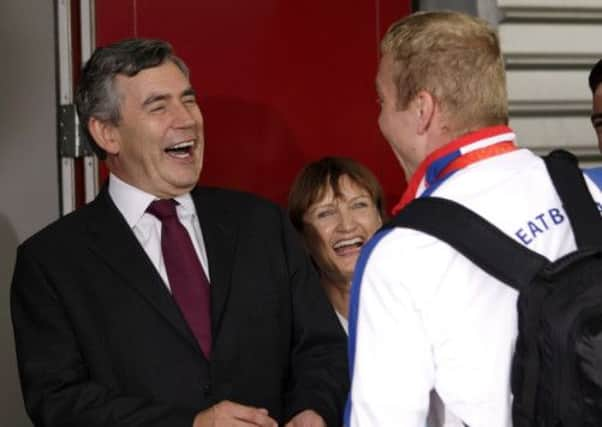‘Gordon Brown at fault for Olympics cost hike’


• Former London mayor Ken Livingston says Gordon Brown was at fault for soaring costs of staging Olympic Games last year
• Mr Livingstone criticised former Chancellor over adding VAT and adding contingency fund
Advertisement
Hide AdAdvertisement
Hide Ad• Hearing into Games legacy also hears of “a lot of very unpleasant politics” during talks over Olympics funding
Mr Livingstone was mayor when the Games were awarded to the capital in 2005, with Mr Brown in charge of the public finances as Chancellor.
The former mayor said there were “huge problems” with Mr Brown over funding for the 2012 Games and “a lot of very unpleasant politics”.
Details of the clash between two of Labour’s most senior figures were revealed during the former mayor’s evidence to a committee of peers examining the Olympics legacy.
At the time of the bid the budget was set at around £4 billion, later rising to £9.2 billion, but Mr Livingstone attacked the then chancellor for charging VAT on the project and putting in place a contingency fund.
Mr Livingstone claimed that prime minister Tony Blair privately complained that his chancellor was using the Olympics budget to pave the way for his own term in Number 10.
Mr Livingstone, appearing alongside Dame Tessa Jowell, was eager to answer peers’ questions on the finances “because I can be ruder about Gordon Brown” than the former Olympics minister.
“That first £4.2 billion estimate, we had about a year to put the whole package together. We had no access to most of the site. We knew there would be a lot of contamination (but) we didn’t expect to find nuclear waste there,” he said.
Advertisement
Hide AdAdvertisement
Hide AdProducing a fully costed programme would have involved spending up to £200 million, rather than the £35 million available for the initial planning and lobbying process, he said.
“The Olympic board, after the bid, worked out it was going to cost another £1.1 billion, we expected, that took you up to £5.3 billion.
“Then we had huge problems with Gordon Brown - no Olympics has ever been told to pay VAT before. So that added another £836 million, a completely nonsensical decision to have made.
“Also, and this was driven very much by the Treasury and Gordon Brown, he insisted on a much larger budget for emergencies and cost overruns. I was hostile to this because my view is if you have a big budget there, or a big capacity for cost overruns, then developers will come along and say ‘the money’s there, let’s start going for it’.
“I would rather have kept it lower but at the end of the day he got his way and it was his decision to build in this scale of cost overruns and so on. I think that was a mistake.”
Mr Livingstone added: “It was purely politically driven and Tony Blair at the time was privately complaining that he thought Gordon was using this increased Olympic budget as an excuse to be able to scale down public spending elsewhere because you were just a year or so away from Gordon succeeding and I think he wanted to have some freedom to manoeuvre.
“So I think there was a lot of very unpleasant politics around all this.”
Dame Tessa acknowledged there were a “pretty tough set of arm wrestles” over the financing of the Games and that costs also increased as a result of the enhanced security after the July 7 terror attacks.
Advertisement
Hide AdAdvertisement
Hide AdSecuring Treasury backing for the bid was hard because it required “unlimited guarantees” for construction, logistics and the staging costs, she told the Lords Olympic and Paralympic Legacy Committee.
“As the then chancellor of the exchequer will say, he had to be put on intravenous Mogadon in order to sign an unlimited guarantee which at the time he thought was probably at risk of being the worst mistake he had ever made,” she said.
“But he rallied (and) after we won was a great support for the Games.
“But obviously the Treasury is risk averse in these circumstances.”
SEE ALSO